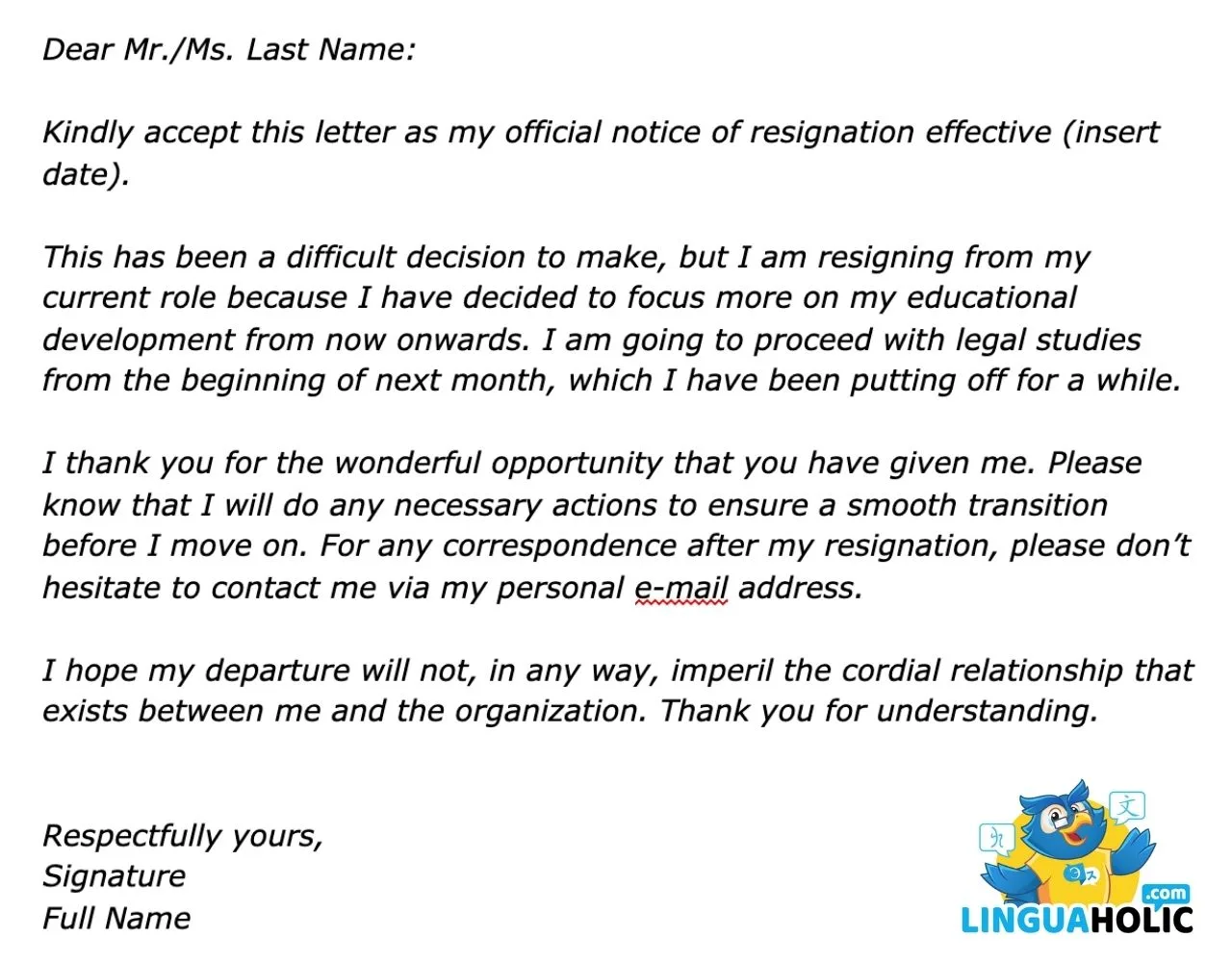You have been working for a company for several years, and you deliberately thought that you’d like to get a move on with life either because of personal or professional reasons.
“Time to say au revoir,” you tell yourself decidedly, “I need a breather because, for some reason, the odds aren’t in my favor anymore.”
In the commercial world, we can officially end our professional relationship by gracefully writing a voluntary resignation letter.
If you’ve been struggling with how to make this happen in the most effective way possible, this article covers this specific topic inside out.
How do we write a voluntary resignation letter?
We can write a voluntary resignation letter by objectively, tactfully, and straightforwardly explaining the purpose of the letter, elaborating the reason behind the decision to resign, expressing appreciation toward the organization, and ending the entire message with a positive note.
Four easy steps to follow when writing a voluntary resignation letter: Explain, Elaborate, Express, End
Nothing is permanent in this world – not even your relationship with your current employer, colleagues, workstation, and office water cooler.
As professional, and even romantic, relationships are expected to end at some point, it is always ethical to inform the other party of your decision formally and officially.
Writing this kind of letter entails tact and deliberate planning because you would always want to leave an organization without people wondering and gossiping about you had to hang up your boots.
There are valid and acceptable reasons that can be related to the need for professional and personal development.
These reasons may include an offer on a better work opportunity, educational enhancement, health, and family-related circumstances.
On the flip side, we should bear in mind never to bad-mouth the employer or any of your coworkers in your letter, not even when the real reason is related to such kind of disappointments.
In writing a voluntary resignation letter, it is imperative to use an objective, polite, and honest tonality across all paragraphs.
Keeping your letter concise enough is also highly recommended, just like how we write a cover letter that has its dos and don’ts.
No matter how much you hate your boss, job, or colleague, you should never, ever, use any offensive words in their reference.
On your behalf, doing so will help you transition to your next prospective job successfully and peacefully.
Here are four simple guidelines to follow for writing a voluntary resignation letter.
Explain your purpose
The concern on how to properly start formal letters is quite an easy-peasy task, but it may not be everyone’s cup of joe. Hence, this section is dedicated to shedding light on this query.
Although your letter may already contain a title that boldly screams “resignation letter,” the first couple of lines should still be composed of your purpose for writing.
Like any other type of formal correspondence, you should clearly inform the addressee as to why he or she is holding and reading a piece of paper.
Ideally, you can write this part within one to two sentences, so as not to overdo the message.
Writing this part at length, as well as the other remaining parts, could prompt an impression of being pretentious.
It is also recommended to include your desired date of resignation to give your employer a heads-up of what’s coming. This will also help you get the upper hand in the process.
But, of course, remember that it is always recommended to verbally discuss your resignation plan with your employer, so as not to suddenly hamper the organizational operations.
Anything along the lines of the statements below should suffice.
Example 1:
I am writing this letter to formally inform you of my plan to resign a month from now (insert exact date).
Example 2:
Kindly accept this letter as my official notice of resignation effective (insert date).
Example 3:
This letter is to formally inform you of my planned resignation on (insert date).
Example 4:
Please be informed that I will be officially resigning from my current role as (insert position) effective (insert date).
Elaborate your reason
The next paragraph line should consist of your official reason for the resignation, which can be done in three to five sentences.
Most of the time, resignees verbally discuss the resignation plan with the employer beforehand, so making this part long would be redundant.
Here are some acceptable reasons that you can state in your letter, which is the meat of the entire message.
If you want to elaborate things further because you have built a solid, positive relationship with the organization, you may do so.
But, it is better to avoid being too flowery with the words used and keep your statements objective, formal, and respectful.
You may start with a sentence having an apologetic tone and continue with your grounds for resignation afterward.
We have other relevant texts like “How to write an apology letter for being disrespectful” and “How to write an apology letter for not attending an event” that could also help you understand more about writing with an apologetic tone.
Example 1:
This has been a difficult decision to make, but I am resigning from my current role because I have decided to focus more on my educational development. I am going to proceed with legal studies from the beginning of next month, which I have been putting off for a while now.
Example 2:
I regret to depart from the organization that has honed my professional knowledge and skills for (insert employment period). However, as discussed, I am leaving because I am getting married and moving to another state soon.
Example 3:
I regret to inform you of this decision, but I am leaving the company because I am taking up another career opportunity outside the country. This decision will also help me get and stay closer to my family, which is also another major priority for me.
Example 4:
As discussed, my decision to resign is compelled by personal reasons that I would do in a heartbeat. I am departing the organization for family-related reasons. I have decided to provide personal health care for my mother who is suffering from a terminal disease.
The examples above are only a few of the most valid and acceptable reasons why an employee may depart from an organization.
Others may also include personal health issues, decision to become a full-time parent, organizational restructuring, or industry change.
Reasons like transportation difficulty, organizational incompetence, an argument with a co-worker, salary or promotion-related frustrations are highly subjective matters that are best avoided.
Express your gratitude to the employer
No matter how bad things may end from your perspective, it is inarguable that your employer has been responsible for paying your utility bills for a certain amount of time.
And, as long as you have also provided decent service to the organization and haven’t had any personal grudges against your co-workers, you must have also built valuable relationships along the way.
With these, the third paragraph deserves a message of appreciation to the company that you’re about to depart from.
Moreover, you had better include a line that mentions how you would like to make the transition phase easier for your current employer.
You may start with a gratitude message and continue with stating how you would be willing to offer assistance before your resignation.
You can also express how you would like to maintain a positive relationship with the organization even after your resignation.
Here are some possible ways to express your gratitude to your employer.
Example 1:
I thank you for the wonderful opportunity that you have given me. Please know that I will do any necessary actions to ensure a smooth transition before I move on. For any correspondence after my resignation, please don’t hesitate to contact me via my personal e-mail address.
Example 2:
I would like to express my gratitude for giving me the chance to hone and showcase my knowledge and skills in this industry. Please recognize that I will do whatever necessary steps to assist the organization before I leave. For any future correspondence, please feel free to reach out via my personal e-mail address.
Example 3:
ABC company has consistently given me an upward career trajectory throughout the years, and I cannot thank you enough for that. I enjoyed my time in your organization. To ensure a healthy transition before and after I move on, please know that I am willing to provide any relevant assistance. Should there be a need for future correspondence, you may reach me via my personal e-mail address.
End with a positive note
Like any other attempt to create a formal correspondence, the resignation letter should end with a positive note, for this is a way of expressing goodwill through language.
Another worth knowing correspondence concern in detail is how to end an e-mail or letter professionally, which also entails detailed guidelines to be followed.
Expressing goodwill wishes demonstrates tact and civility, which is a highly functional adhesive that holds society together, especially in the business world.
You can keep this part in one to two sentences, just like the introductory lines explained earlier.
Here are some examples that you may use:
Example 1:
I do hope we could still stay in touch as business colleagues in the future, should there be any chance to do so. Thank you very much for understanding.
Example 2:
I look forward to working with you again in the future, should the circumstances dictate so. Thank you very much for understanding my decision.
Example 3:
I hope my departure will not, in any way, imperil the cordial relationship that exists between me and the organization. Thank you for understanding.
Example 4:
Thank you for all the opportunities, and I wish everyone in (insert company name) all the best.
Example 5:
Thank you very much for your guidance and support throughout my employment. May the organization keep flourishing in the future.
Voluntary resignation letter sample
Now that we’ve explicitly discussed how to structure the recommended parts of a voluntary letter, let us now see how all the elaborated elements fit together as a whole.
Any formal correspondence should start with an appropriate salutation. However, we may get bored with using the classic one that starts with the adjective “dear.”
We may also refer to our other article titled “Dear Sir or Madam – 10 Great Alternatives” to sort out this writing concern.
Kindly refer to the example voluntary resignation letter below.

Frequently Asked Questions on “How to Write a Voluntary Resignation Letter”
What is a voluntary resignation letter?
A voluntary resignation letter is a form of business correspondence to be provided by the resignee to a target organization where he or she belongs. Ideally, voluntary resignation is to be officially rendered at least two to four weeks before the desired resignation date.
How do you write a powerful resignation letter?
To create a voluntary resignation letter, one has to be consistently objective, polite, and direct throughout the entire message. Indicating the desired resignation date, the reason for resignation, appreciation toward the organization, and a concluding goodwill message are its key elements.
Conclusion
As voluntary resignations are naturally expected in any workplace setting, employers should have a solid system as to how they would meet such challenges.
If you’re someone working for the management side, you may also have to understand how to respond to a resignation letter appropriately.
Similarly, any resignee must also be keen enough to follow proper procedures with tact and civility to maintain social and professional harmony in the commercial realm.

Hey fellow Linguaholics! It’s me, Marcel. I am the proud owner of linguaholic.com. Languages have always been my passion and I have studied Linguistics, Computational Linguistics and Sinology at the University of Zurich. It is my utmost pleasure to share with all of you guys what I know about languages and linguistics in general.

